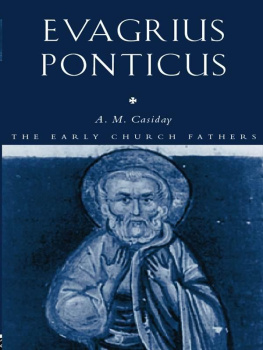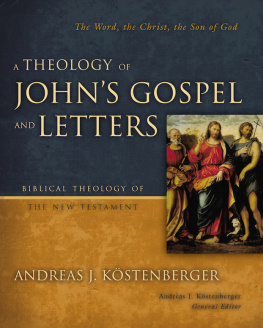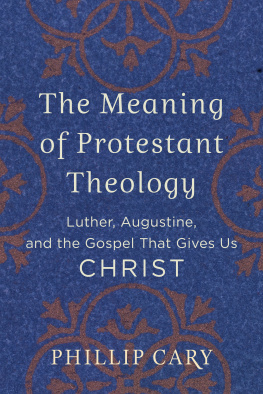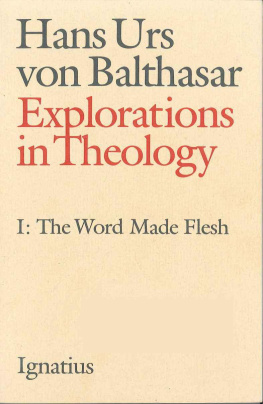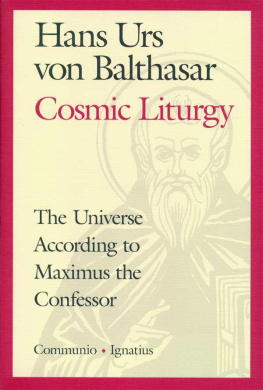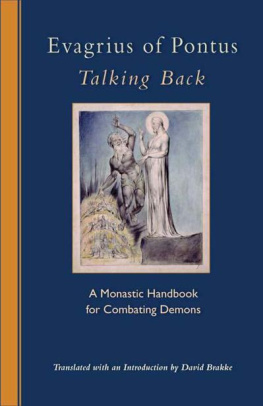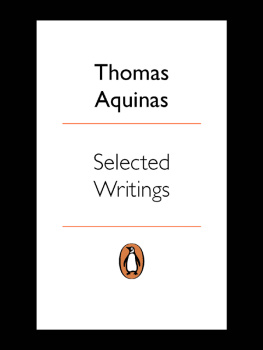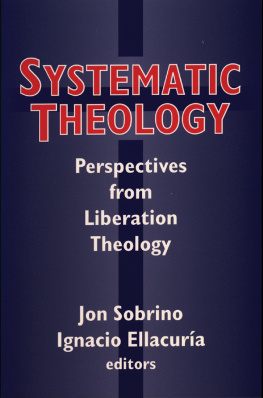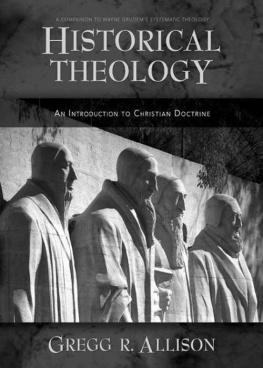Reconstructing the Theology of Evagrius Ponticus
Evagrius Ponticus is regarded by many scholars as the architect of the eastern heresy Origenism, as his theology corresponded to the debates that erupted in 399 AD and episodically thereafter, culminating in the Second Council of Constantinople in 553. However, some scholars now question this conventional interpretation of Evagrius place in the Origenist controversies. Augustine Casiday sets out to reconstruct Evagrius theology in its own terms, freeing interpretation of his work from the reputation for heresy that overwhelmed it, and studying his life, writings and evolving legacy in detail. The first part of this book discusses the transmission of Evagrius writings and provides a framework of his life for understanding his writing and theology, whilst moves to a synthetic study of major themes that emerge from his writings. This book will be an invaluable addition to scholarship on Christian theology, patristics, heresy and ancient philosophy.
AUGUSTINE CASIDAY is an Honorary Research Fellow at Cardiff University and is author of Tradition and Theology in St John Cassian (2006) and The Trinity and Incarnate Word (2008). He is editor of The Orthodox Christian World (2012), co-editor with Andrew Louth of Byzantine Orthodoxies (2006) and, with Frederick W. Norris, of The Cambridge History of Christianity , vol. II: Constantine to c. 600 (2007).
Reconstructing the Theology of Evagrius Ponticus
Beyond Heresy
Augustine Casiday
University Printing House, Cambridge CB2 8BS, United Kingdom
Cambridge University Press is part of the University of Cambridge.
It furthers the Universitys mission by disseminating knowledge in the pursuit of education, learning, and research at the highest international levels of excellence.
Published in the United States of America by Cambridge University Press, New York
www.cambridge.org
Information on this title: www.cambridge.org/9780521896801
Augustine Casiday
This publication is in copyright. Subject to statutory exception and to the provisions of relevant collective licensing agreements, no reproduction of any part may take place without the written permission of Cambridge University Press.
First published 2013
Printed and Bound in the United Kingdom by the MPG Books Group
A catalogue record for this publication is available from the British Library
Library of Congress Cataloging-in-Publication data
Casiday, Augustine.
Reconstructing the theology of Evagrius Ponticus : beyond heresy / by Augustine Casiday.
pages cm
Includes bibliographical references and index.
ISBN 978-0-521-89680-1
1. Evagrius, Ponticus, 345?399. I. Title.
BR65.E926C36 2013
270.2092dc23
2012032864
ISBN 978-0-521-89680-1 Hardback
Cambridge University Press has no responsibility for the persistence or accuracy of URLs for external or third-party internet websites referred to in this publication, and does not guarantee that any content on such websites is, or will remain, accurate or appropriate.
To my parents
Contents
Acknowledgements
Research for this book began in Durham University, where I held a Leverhulme Early Career Fellowship from 2005 to 2007. I am deeply obliged to the Leverhulme Trust for their generosity and to former colleagues at Durham for their support. I would like to thank by name John Barclay, Douglas Davies, Andrew Louth and Loren Stuckenbruck. Subsequent to that fellowship, I was appointed to a lectureship in the University of Wales, Lampeter, where I have again been blessed with excellent and supportive colleagues: let me mention Matthew Hill, Johannes Hoff, Paul Middleton, Tom OLoughlin, Ruth Russell-Jones, Paula Yates and (under the universitys new banner as the University of Wales, Trinity Saint David) Densil Morgan. Outside the universities, friendships and conversations with Alan Brown, John Littleton, and Tim and Sue Pearce have sustained me. O si sic omnes!
My profoundest thanks are due to my parents, Nelson Casiday and Teresa White, whose unstinting love and assistance particularly during the last three years of this books long gestation have been indispensable. To them I dedicate it as a token of gratitude.
Lampeter,
24 April 2012
Abbreviations
| ACO | Acta Conciliorum Oecumenicorum (Berlin: Walter de Gruyter) |
| Ad mon | Evagrius, Ad monachos |
| CPG | Clavis Patrum Graecorum |
| CS | Cistercian Studies (Kalamazoo, MI: Cistercian Publications) |
| CSCO | Corpus Scriptorum Christianorum Orientalium (Leuven: Peeters) |
| CSEL | Corpus Scriptorum Ecclesiasticorum Latinorum (Vienna: Verlag der Osterreichischen Akademie der Wissenschaften) |
| DLT | Darton Longman and Todd |
| GCS | Griechische Christliche Schriften der ersten drei Jahrhunderte (Berlin: Akademie-Verlag) |
| GNO | Gregorii Nyssenis Opera (Leiden: Brill) |
| KG | Evagrius, Kephalaia Gnostica |
| LCL | Loeb Classical Library |
| LXX | The Septuagint text of the Hebrew Bible |
| NPNF | Nicene and Post-Nicene Fathers of the Church (Edinburgh: T & T Clark) |
| PG | Patrologia cursus completus... series Graeca (Paris: Garnier) |
| PL | Patrologia cursus completus... series Latina (Paris: Garnier) |
| PO | Patrologia orientalis (Turnhout: Brepols) |
| Prak | Evagrius, Praktikos |
| PTS | Patristische Texte und Studien (Berlin: Walter de Gruyter) |
| SA | Studia Anselmiana (Rome: Sant Anselmo) |
| SC | Sources chrtiennes (Paris: Les ditions du Cerf) |
| sch . | scholion, scholia |
| SP | Studia Patristica |
| SVF | J. von Arnim, ed., Stoicorum Veterum Fragmenta |
| TU | Texte und Untersuchungen zur Geschichte der altchristlichen Literatur (Leipzig: Hinrichs) |
Introduction: Evagrius Ponticus and his theology
0.1 Developments in the modern study of Evagrius Ponticus
In the course of the twentieth century, two major developments transformed our awareness of Evagrius Ponticus, a figure known (chiefly from external references in ecclesiastical histories and other documents) to have lived in Egypt in the final decades of the fourth century and to have been associated with fierce debates over the legacy of Origen of Alexandria that began in the later years of his life and roiled on for some time.
The first was an unprecedented increase in the rate of recovering Evagrius writings not only in their original Greek, but also in ancient translations. The publication of major funds of Evagrian writings began in 1907, when Fr Barsegh Sarghissian of the Mekhitarist monastery of San Lazzaro degli Armeni brought out a volume of Evagriana, surviving in Armenian, under the title Srboy horn Evagri Pontacwoy. Vark ew matengrutiwnk targmanealki yowne i hay barbar i hingerord daroy . The translations are important because they provide access, albeit at a linguistic remove, to documents which were otherwise lost to us. But they are also important because they have enabled scholars to identify confidently some writings in Greek that are now known to have been written by Evagrius, despite the fact that they have been traditionally attributed to someone else. There is even a case in which the consensus of ancient translations allows modern scholars to reach behind the surviving Greek text, as it were, and to argue for the loss of content in the Greek tradition. (We will come on to specific examples in due course.) As for documents in the original Greek, critical research into manuscripts especially the research undertaken by Antoine Guillaumont, Claire Guillaumont and Paul Ghin under the auspices of the Centre National de la Recherche Scientifique has produced many volumes of Evagrius notes (or scholia ) on various biblical texts and of his chapters (or kephalaia ) that describe and analyse key aspects of the Christian monastic life. We will have more to say about Evagrius writings and their recovery later in this book, but for now it suffices to note that since 1907 dozens of writings have been recovered and published.


